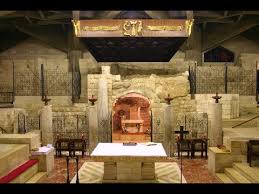We’re all familiar with C. S. Lewis’s trilemma that Jesus, as portrayed in the Gospels, was either a lunatic, a liar, or Lord of the World. Jesus certainly didn’t seem to be a lunatic. Indeed, He was the cure for lunacy – casting out demons from those possessed – and never proposing anything as lunatic as, say, choosing your pronouns or drag-queen story hour or the idea that men can become pregnant.
Liar doesn’t fit Him either. He was, instead, a pretty obvious truth-teller, unafraid of uncomfortable truths, hard truths, and ultimate truths that most people try to gloss over, fudge, or deny. And His chief enemy goes by the name of the Prince of Lies. That prince has all the seductive lies that people like to hear: that there is no such thing as sin, that they can be as gods, that they can invent their own reality.
As for Lord, well, that does seem to suit the facts, but who, these days, wants to believe that? Who wants to repent of his sins or be judged by God? And so we often now hear of a fourth possibility: that Jesus was merely a legend, the most insupportable argument of all.
As far as textual and documentary evidence goes, we have far better sources for the life of Jesus than we do for any other figure of the ancient world. It’s not even close. And that includes figures like Alexander the Great and Julius Caesar.
When we talk of Alexander the Great, we cite texts written 300 years after his death – all earlier accounts were lost. And our earliest copies of these texts date from a thousand years later. When we talk of Caesar’s Gallic Wars, our earliest copy dates from the Dark Ages, more than 900 years after he wrote it. Essentially every classical text we have – except for crumbing tablets or fragments of papyrus – date from the Middle Ages, the work of diligent scribbling monks or Islamic scholars, and usually in only a handful of copies.
By contrast, not only were all the New Testament documents originally composed in the first century, within decades of the events, but we have thousands of copies dating from Roman times. The Gospels, Acts of the Apostles, the letters to churches are all very keen on citing names, dates, and eyewitnesses. The apostles, indeed, testified as to their truth to the point of martyrdom.
The argument that Jesus was a legend is really just a sort of adolescent reflex, a matter of dismissing Christianity without a second thought, invoking “flying spaghetti monsters” or “Why your God and not the 4,200 other gods?” (The Bible actually talks about that). Or “No intelligent person can possibly believe that fairy tale.”
In other words, it is sort of an anti-argument that makes no case at all, disdaining any engagement with the evidence as unnecessary. It’s the perfect argument for the very young because it is based on the young’s special province: snark, egotism, and ignorance. It’s, however, undeniably weak on its face, and seems a very feeble version of the “argument from authority” (as in “no intelligent person”).

Even on its own terms, it’s self-refuting. After all, if we’re going to invoke intelligent people, how many of us are better logicians than Aquinas? More astute philosophers than Saint Augustine? Better cosmologists than Georges Lemaître – mathematician, physicist, astronomer, and priest who proposed the “Big Bang” theory?
How many of us walk around with credentials like those of popular columnist and Catholic priest, the Reverend Tadeusz Pacholczyk? Who, ahem, “has degrees in philosophy, biochemistry, molecular cell biology, and chemistry. He later earned a PhD in neuroscience from Yale University. . . . After working for several years as a molecular biologist at Massachusetts General Hospital/Harvard Medical School, Fr. Pacholczyk studied in Rome at both the Gregorian University and the Lateran University, where he did advanced work in dogmatic theology and bioethics.”
Now, just for the sake of argument, what if we imagined Jesus as a mere carpenter, full stop? What if instead of being Lord of the World, he was instead history’s greatest carpenter, businessman, and entrepreneur, creating a vast multi-national corporation, begun in obscurity in Judea, now based in Rome, with branch offices (and independent spin-off companies) in every country in the world, serving nearly a third of the world’s population, with well more than two billion current customers, and represented by the slogan, “He Gets Us – and All Our Furniture Needs.” Would anyone think this carpenter to be a lunatic, a liar, or a legend? He would be an ancient J. P. Morgan or John D. Rockefeller. He would have His share of critics, but no one would dismiss Him as a fairy tale, for a very simple reason: He would make no claim on us.
But if He were to appear as a Holy Hologram on Shark Tank, reminding entrepreneurs to value their souls even more than their companies, to repent of their sins, to worship the Lord their God – well, that would be another case entirely.
Disbelief in the Christian revelation is, for most people, not a matter of philosophical argument or historical evidence, it is simply a matter of desire: a desire not to believe, and almost invariably not to be judged, especially in matters of sexual morality.
Secularization in the West is, in effect, an alternative faith, entirely fictitious, subjective, and driven by short-term self-interest. And while it poses as progressive – the Science! – it’s instead the path of moral, intellectual, and cultural decadence, where adolescent attitudes rule, reason is forfeit, objective truth denied, and moral law abandoned.
The only corrective may lie in “The Gods of the Copybook Headings.” For, as Kipling taught us, when “the brave new world begins/ When all men are paid for existing and no man must pay for his sins,/ As surely as Water will wet us, as surely as Fire will burn,/ The Gods of the Copybook Headings with terror and slaughter return!”
















